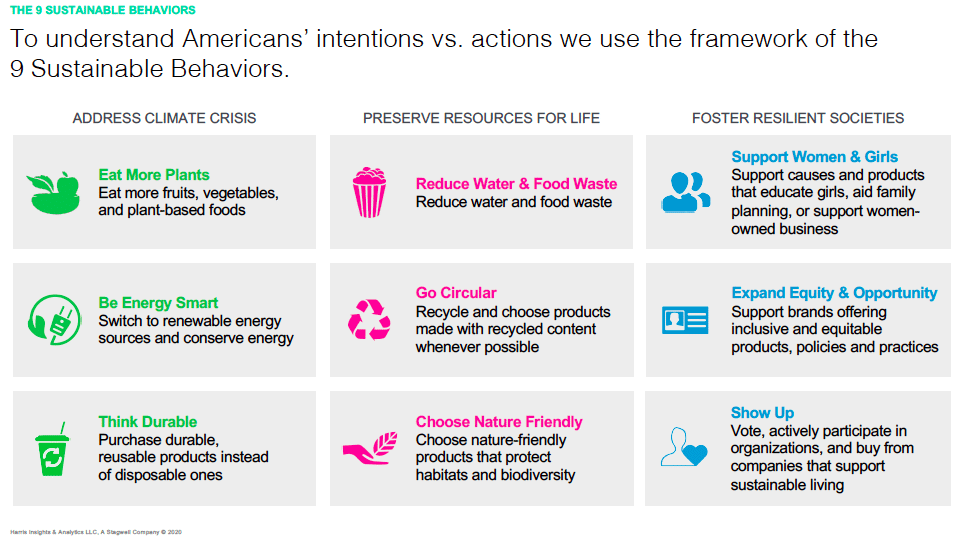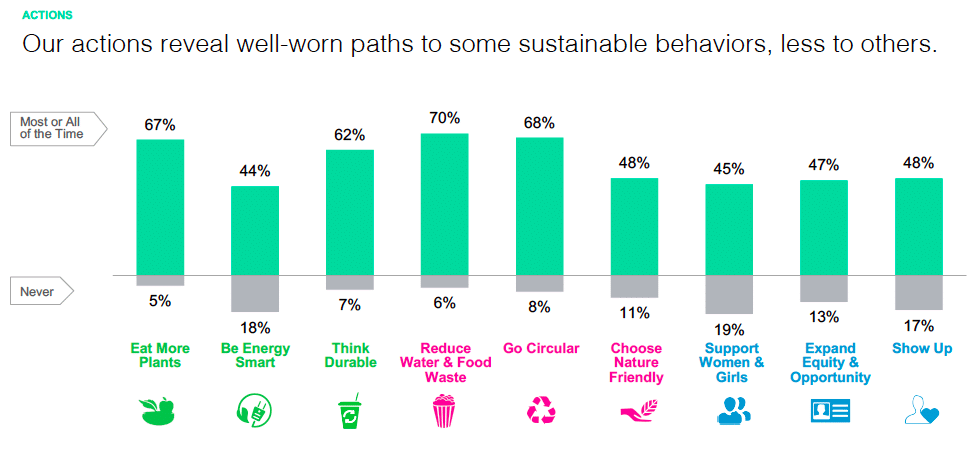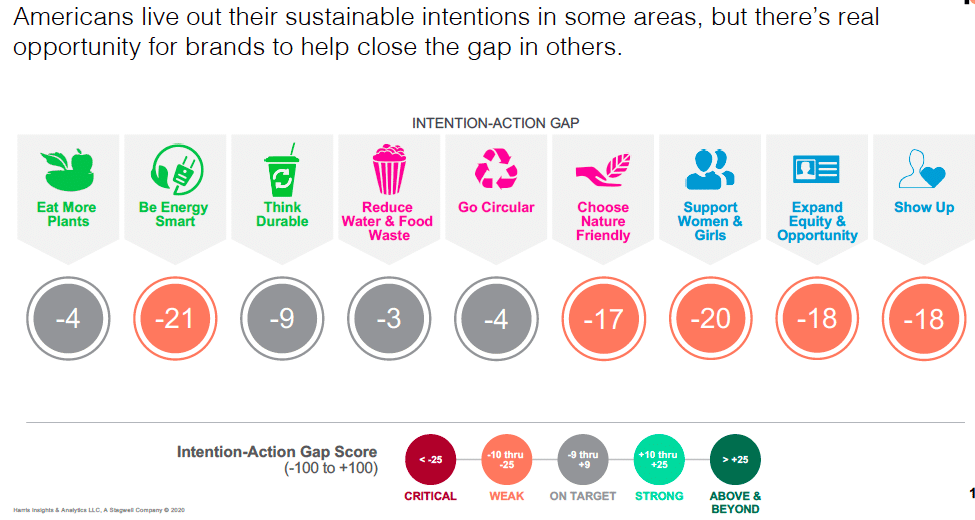Can Good Intentions Turn Into Action?
September 21-27 is Climate Week, and every day we’ll be looking at public perceptions on climate change, new climate solutions, and developments announced at the virtual event coordinated by the United Nations and city of New York. Learn more and join the conversation live on Facebook.
How has COVID-19 affected consumer attitudes toward climate?
Main Street no longer needs to be convinced of the realities of the climate crisis. With fires raging in the West, hurricanes bearing down on the South and a global pandemic still in our midst, new research suggests that Americans have not forgotten about climate change – and are perhaps even more aware of their role in addressing it.

“Standing together, six feet apart” has become a daily reminder of how our actions affect each other. In a recent Harris Poll by Sustainable Brands, 70% of those surveyed said COVID-19 has made them more aware of global issues.
Logic suggests that living through a pandemic might be the only thing we can handle right now, but Americans are showing a surprising ability to be concerned about more than one issue at a time. A Yale study conducted in April, at the height of sheltering in place, showed that Americans’ concern about climate change has not waned at all. In fact, 73% of Americans believe climate change is happening, consistent with the same study’s findings six months prior. Two in three Americans (66%) feel a personal sense of responsibility to help reduce global warming.
Perhaps most encouraging was a study by the Futerra Group, conducted in May, in which 77% of Americans said they believed we should “make as many big lifestyle changes to stop climate change as we are making to stop COVID-19.”
Despite everything happening around us (or perhaps because of it), the public remains concerned about climate change. But how will we respond?
How sustainably are we behaving?
As any good marketer knows, intending to take action on climate change by living more sustainably is vastly different than actually living out those intentions. The Sustainable Brands Survey mentioned above, which was conducted in late July/early August 2020, found that more than 95% of Americans say they try to live sustainable lifestyles at least some of the time.
COVID-19 is taking a toll on our lives, however, and that includes our attention to sustainability: 73% feared leaving their home for personal errands, while 56% fear personal death. On Maslow’s hierarchy of needs, it would seem, practicing sustainable behaviors is far down the list.
But looking at Sustainable Brands’ nine key sustainable behaviors below (those considered most impactful from a climate perspective), consumers are still making progress. Not surprisingly, we live out our sustainable intentions in some areas more than others. This may be explained because some actions are simply easier to take.

For example, reducing water and food waste is an area where consumers are able to align their intentions with actions fairly easily: 70% of consumers say they reduce water or food waste “most or all of the time.”

Other sustainable behaviors are not acted upon so easily. For example, being “energy smart” ranked as the lowest sustainable behavior in the survey: Only 44% of those surveyed say they conserve energy or have considered switching to renewable energy, while 65% say they intend to do so. That’s a gap of 21 points—and it represents a huge opportunity for sustainability and clean energy marketers.

Mind the (Solutions) Gap
If our intentions are so good, why do we fail to act on them?
Let’s take a closer look at energy. Across all sustainable behaviors, “being energy smart” stands out as one of the least acted-upon intentions. Yet a plethora of smart energy options are readily available, from smart thermostats to solar energy for homes and businesses.
Consumers’ reluctance to take action is often blamed on inertia, or worse, apathy. We just don’t care enough to be energy smart. But this explanation falls short when considering the effort required by other sustainable behaviors. Composting food waste requires a significant effort to build and consistently tend to a compost pile. One could argue that this is much more difficult than buying a programmable thermostat or turning up the thermostat on a hot day.
We are less defined by our demographics than we are by our psychological makeup, despite the expectation to the contrary. The study found that sustainable behaviors don’t vary wildly by age group or even across political parties. Conservatives are nearly as likely as liberals to engage in sustainable behavior.
So what makes us take action?
Some of us may be motivated by financial security, while others might be trying to assuage guilt, make reparations for their past bad behaviors, or earn admiration from our neighbors.
The answer lies in identifying the motivations that drive people to cross the chasm between intent and action.
With all of this new data available now, are we missing the mark on solar marketing?
Solar energy is typically marketed to consumers and businesses in stark, quantifiable terms: Go solar to save money. Get solar for no money down!
But this is a silo-value proposition that misses the mark for a huge portion of the audience. Without pairing this bottom-line benefit with social and emotional benefits, you may be missing out on two-thirds of your audience.
In the rush to close more deals before the ITC expires at the end of this year, solar companies have been pushing the financial message above all others.
Even if your audience responds to these hard-sale tactics, there’s a good chance a certain percentage of them will never close. It’s not because they’re not motivated. It’s because we’ve ignored the social and emotional drivers that make people trust your business enough to take the leap on solar.
Treating solar as the sustainable action it is
COVID-19 may be overwhelming consumers, but it’s also made them more aware of the actions they can take to control what they can. Going solar is one of those actions. But we have to recognize that their reasons may be more complex than we thought.
As we move into planning our solar marketing strategies for 2021, can we agree that it’s time to start treating our customers like the multifaceted individuals they are?
Marketing sustainable solutions – whether it’s solar energy or organic soap – requires us to dig deep into the soul of the consumer to find out what’s really motivating them. When we do this, we may find entirely new audiences for our products – and completely different ways of talking to them.
Stay on top of the latest climate trends and solutions with the Bright Ideas newsletter. Sign up.



